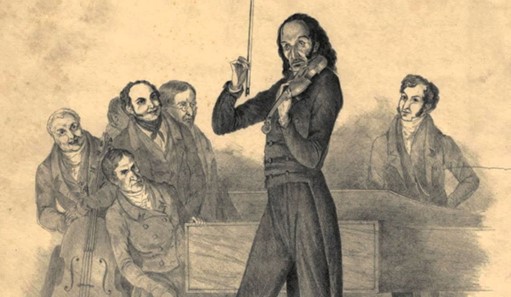
In 1979, the Charlie Daniels Band proved that a song about fiddles could become a national hit.
The Devil Went Down to Georgia is the account of an epic fiddle-playing contest between Satan and a young man named Johnny. Who is the ultimate virtuoso? The stakes are high – Johnny’s soul. But as Daniels lets us know at the end of the song, Johnny is able to outplay the prince of darkness, earning the right to say he’s “the best that’s ever been.”
In the real world of string instruments, music historians concur that “the best that’s ever been” is almost certainly the Italian violinist Niccola Paganini (1782-1840).
His gifts were so extraordinary, in fact, that many of those who heard him became convinced he had sold his soul to Satan. How else could they account for his genius?
Paganini’s chance to perform in the greatest concert halls of Europe lasted only 12 years. But it’s hard to overstate his legendary impact. His compositions were so complex that they were considered unplayable – until Paganini himself showed up and played them. He was the world’s first orchestral rock star. More than a century before Frank Sinatra, Elvis Presley, and the Beatles, young women threw themselves at his feet.
Ever the showman, Paganini sometimes secretly filed notches into the G, D, and A strings of his four-string violin. Those strings would eventually snap under the pressure of his vigorous playing, leaving only the E string, which produces the highest notes on the scale. Then he would bring the house down by finishing his piece on the E string alone.
His creativity and audacity are on full display in his best-known compositions, the 24 Caprices. Few violinists have risen to the challenge of mastering them. One of them is a 19-year-old phenom named Sumina Studer. Here’s her rendition of Caprice No. 5 in A Minor: N. Paganini Caprice no. 5 | Sumina Studer – YouTube. Suffice it to say that she can give both Charlie Daniels and Johnny down in Georgia a run for their money.
Hearing those incredibly high notes on the E string, it’s easy to understand why audiences seriously entertained the thought that Paganini had made a deal with the devil.
Paganini himself stoked those rumors.
It helped that his name meant “little pagan.” Tall and thin, he customarily dressed in black from head to toe and wore dark blue sunglasses. As late-stage syphilis took a toll on his body, his face was contorted into a spectral grimace. Gossips whispered that his E string was actually made from the intestine of one of his mistresses, whom he had murdered with his own hands. He had supposedly languished in jail for 20 years to pay for this crime, his violin his only companion. During that time, with Lucifer’s help, he had been given access to his instrument’s greatest secrets.
If your goal is to fill concert halls, you just can’t ask for better publicity than that.
But that, of course, was the problem.
Paganini – arguably the most gifted violinist of all time – succumbed to what sociologists would call his “shadow mission.”
What’s a shadow mission? It’s a misuse of our gifts – a detour from the true mission we have each received from the One who provides all such gifts. A teacher’s true mission is to grow the hearts and minds of students, not to pursue the shadow mission of becoming famous and popular because of exceptional teaching. A friend’s true mission is to provide to others the treasures of compassion and partnership, not to give in to the shadow mission of using such friendships as a means to enter higher social circles.
In the case of great artists like Paganini, the true mission is to connect people to the enduring, God-given realities of beauty and truth. But there’s always a temptation for one’s performance to become All About Me. That’s the shadow mission. And Paganini couldn’t resist the rush of becoming known as the world’s most spectacular entertainer.
He died at the age of 57, essentially worn out by having “been there and done that” in every realm of life except peace of mind.
Our culture applauds giftedness but shrugs at character. As long as you can hit home runs for the Yankees, impress Simon Cowell on America’s Got Talent, or make your audience both laugh and cry during your big talk at work, you can be a hero. You can even become a highly paid but seriously flawed human being.
But apart from devoting ourselves to the character qualities we so desperately need to steer our talents wisely – humility, generosity, honesty, and love – our gifts will almost always lead us astray.
They may even destroy us.
Does the devil really make deals with people in exchange for their souls? The Bible is silent on that subject.
But we may be fairly certain that dark powers will always be rooting for us to fall so deeply in love with our gifts that we gradually forget that life is all about walking with their ultimate Giver.
